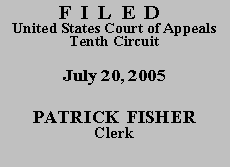

| STEPHEN JOE HOOVER,
Plaintiff-Appellant, v. KELLY WEST; EARL MARKLAND; ROYCE MELTON; J. D. DAVIS; GARY GIBSON; RANDALL WORKMAN; FRANK KEATING, Defendants-Appellees. |
|
Stephen J. Hoover, a former Oklahoma prisoner appearing pro se and in forma pauperis, filed an action pursuant to 42 U.S.C. § 1983, alleging that Defendant West had assaulted him in his cell. The district court dismissed the matter without prejudice for failure to exhaust administrative remedies, as required by 42 U.S.C. § 1997e(a), and this court affirmed that dismissal. Hoover v. West, 93 Fed. Appx. 177 (10th Cir. Feb. 19, 2004). Hoover then returned to district court and filed a "Motion to Vacate District Court Order of Dismissal and To Correct the Record" under Fed. R. Civ. P. 60(b), arguing that the courts' decisions were based on incomplete and inaccurate information about his filings in the prison grievance system. After the district court denied his motion, Hoover filed this appeal. We affirm.
Rule 60(b) permits relief from a final judgment on the grounds of newly discovered evidence, fraud, misrepresentation, and other misconduct of an adverse party, but only in exceptional circumstances. Cummings v. Gen. Motors Corp., 365 F.3d 944, 954 (10th Cir. 2004). We review a district court's ruling on the issue for an abuse of discretion. Id. Under this standard, the district court's denial of relief will be upheld unless it represents "a definite, clear or unmistakable error." Id. at 955.
Hoover asserts that the district court should have granted his Rule 60(b) motion and re-opened his case so that he could supplement the record with material that was fraudulently concealed during earlier proceedings. A review of the record, however, reveals that Hoover himself submitted the evidence in question to both the district court and this court. We see no abuse of discretion in the district court's denial of Hoover's Rule 60(b) motion. We remind Hoover that he must continue to make partial payments until the entire amount of his appellate filing fee is paid.
The judgment of the district court is AFFIRMED.
Entered for the Court
Circuit Judge
*. This order and judgment is not binding precedent, except under the doctrines of law of the case, res judicata, and collateral estoppel. The court generally disfavors the citation of orders and judgments; nevertheless, an order and judgment may be cited under the terms and conditions of 10th Cir. R. 36.3.